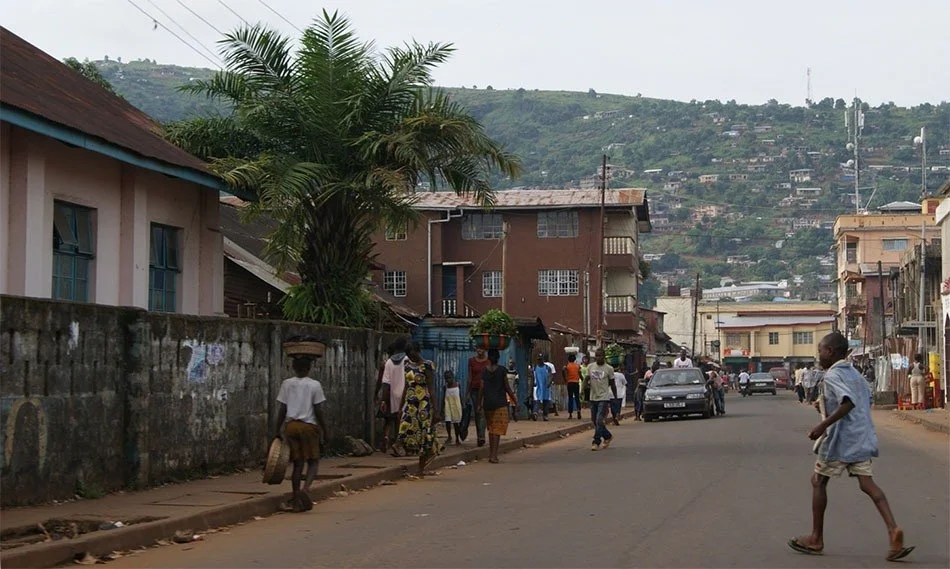Human Rights Day: the perspective from Sierra Leone
Freetown | Credit: Annabel Symington
Much anticipated curbing of libel law to take place soon in Sierra Leone
If the will of pressure groups, especially stakeholders in literary circles, meets the will of the government of Sierra Leone, the country will soon reach a freedom of expression milestone, reflecting the country’s national motto: “Unity, Freedom and Justice”.
There are great expectations in Sierra Leone concerning the repeal of Part V of the 1965 Public Order Act dealing with libel laws. Repeated assurances by the Honorable President, the Vice President and the Minister of Information, quoted in the media, have pointed towards the end of these powerful criminal defamation laws, which unduly restrict freedom of expression. This would end the use of criminal sanctions to provide redress for reputation, thus yielding relatively increased freedom of expression in the country. As it stands currently, a bill to repeal the libel law is being debated before parliament.
In another positive sign for media freedom in the country, President Bio has announced that his government would provide the Independent Media Commission (IMC), which is empowered to assess complaints against the media, with the leverage it needs to work independently. This is vital in order for the IMC to uphold its independent and effective role as regulator of the media.
This success is the result of many years of hard work advocating against the criminal libel laws in the country. The Sierra Leone Association of Journalists (SLAJ) was established in 1975 partly to advocate for the abolition of draconian laws that were imported from Ghana and passed into law in Sierra Leone in 1965. Successive governments and politicians used the laws mainly against journalists; the prospect of their use instilled fear in the minds of media practitioners across the country. Over the years, these laws not only kept the media feeling constant unease and practicing self-censorship, but were also used to occasionally target writers and musicians who used satire or artistic expression to comment on political events or on the country’s rulers.
Political critics, opposition activists, dissidents and human rights defenders were targeted for exposing violations committed by the authorities, and other actors. Such individuals frequently faced police harassment, arrests, detention, prosecution and trial, and public vilification by the government and its supporters.
Advocacy work and campaigning by media stakeholders and other relevant civil society organizations against the criminal libel laws enshrined in the 1965 Public Order Act reached a climax in September 2016, when a National Symposium was held in Freetown to address their possible decriminalisation. During the symposium, participants developed a policy paper that was submitted to the government. With pressure from civil society organisations including PEN Sierra Leone, the government published a white paper in 2017 for onward submission to Parliament for enactment.
PEN Sierra Leone played a key role in this, in collaboration with other African PEN Centres, through the United Nations Democracy Fund Project entitled “Strengthening the Voice of African Writers in civil society to promote freedom of expression and democracy.” Over the years, PEN Sierra Leone organized several stakeholder meetings in the country, inviting key representatives from the Ministry of Information and Communication and the Ministry of Justice, the Attorney General and the general public, for dialogue on the issue.
Today, the media landscape in Sierra Leone – made up of independent and state-owned newspapers, radio and television stations – is growing with new media outlets, especially newspapers, registering every day. However, as SLAJ President Ahmed Sahid Nasralla expressed during a courtesy call to President Maada Bio in early December 2019, the abolition of the criminal libel law would further attract private investors into the media business and strengthen democracy in the country.
At this meeting, President Bio assured the press of the progress of the repeal process, and his commitment to the development of a free media landscape, but made a point of reminding the SLAJ of the responsibility the media bears to accurately represent Sierra Leoneans, as a free press is an essential mechanism of accountability.
PEN Sierra Leone also reminds the media of their responsibility to remain ethical and professional as they carry out their journalistic duties, and remains committed to work alongside SLAJ and other partners to ensure that the libel repeal process is complete and that civil defamation laws are structured carefully, in order to limit their potential to be open to abuse.
Until the bill to repeal Part V of the 1965 Public Order Act is passed into law, a person could potentially be brought in for questioning by the Criminal Investigation Department in Freetown whenever it is deemed they have tarnished the reputation of a Minister or other senior public servant. It is high time this law is scrapped.
Allieu Kamara is a journalist. He practiced journalism for five years before joining PEN Sierra Leone where he is the Administrative Secretary. His article ‘Waterside Stone’ appears in the book ‘Magic’, published in 2018 by the Reading Sierra Leone Project, a programme that develops children’s stories for primary schools in Sierra Leone.

